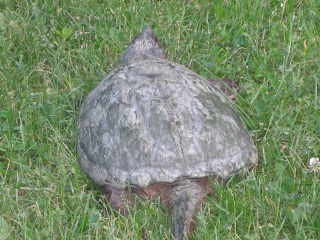I live in an area of Shelburne with a lot of ponds and streams and every June on the weekend of my birthday we get a visit from the turtle population of Beaver Creek.
They love to lay their eggs in the warm soft soil of my mother's flower gardens. It’s fun to watch, and I look forward to it every year. It’s constant and dependable, like New Years Eve, and the outcome of Groundhog Day.
These aren’t your run of the mill turtles, these are full on, ugly as can be, snapping turtles. The turtles range from the size of a frisbee to the size of a trash can lid. They look like the beginnings of Jurassic Park, and they have claws that would make Edward Scissorhands jealous. They’re also vicious and can bite off your entire hand if you aren’t careful.
This year we saw four turtles laying eggs, but many more probably came that we didn’t see. In the past we have seen sixteen in one weekend. Now that’s a record that’s hard to beat.
In the fall their eggs will hatch and we will watch the baby snapping turtles make the mad dash for the stream to safety. But not all of them will make it.
Some of the turtles will be picked off by hawks, and eaten. This is possible because their shells will still be soft and easy to break through. It is a sad fact of life, but every hawk has to eat too. And others won’t make it because they were run over, or couldn’t find food or shelter in time.
Watching the turtles every year has taught me a few things about life.
First of all, don’t lay your eggs where a car will easily back over them. Use common sense and think before you act, or you might lose everything you’ve been working for.
Second, when you’re in the wild, it really is the survival of the fittest. The turtles that are fast enough will make it to the stream, find shelter and something to eat, and make it to the age where their shell is hardened. I think this is what makes these snappers so mean. They had to work hard to get to where they are, and they won’t let you, or anyone else screw it up for them. This is the kind of mentality you need to keep if you really want to something you’ve been working for.
Third, life is a circle. Every Hawk has to eat, and so does every turtle, the circle comes back around every year when new eggs are laid and new eggs are hatched. Life is like energy, it can’t be created or destroyed. If one turtle gives its life so another animal can live, it’s just keeping the circle going. Life will always go on.
Fourth, take chances. If you don’t take that first chance, the mad dash to the pond, then you will die without ever living. If I never take risks I’ll never get anywhere in life. I’m just like one of the baby turtles, but prettier.
And Last, just because a couple of your eggs didn’t make it, doesn’t mean you were a complete failure. One of those baby turtles might be the future king of the pond. To apply this to my life, I can’t let the little failures trip me up. I need to keep my head high and focus on the things that did work out. Because it really is only one egg.





